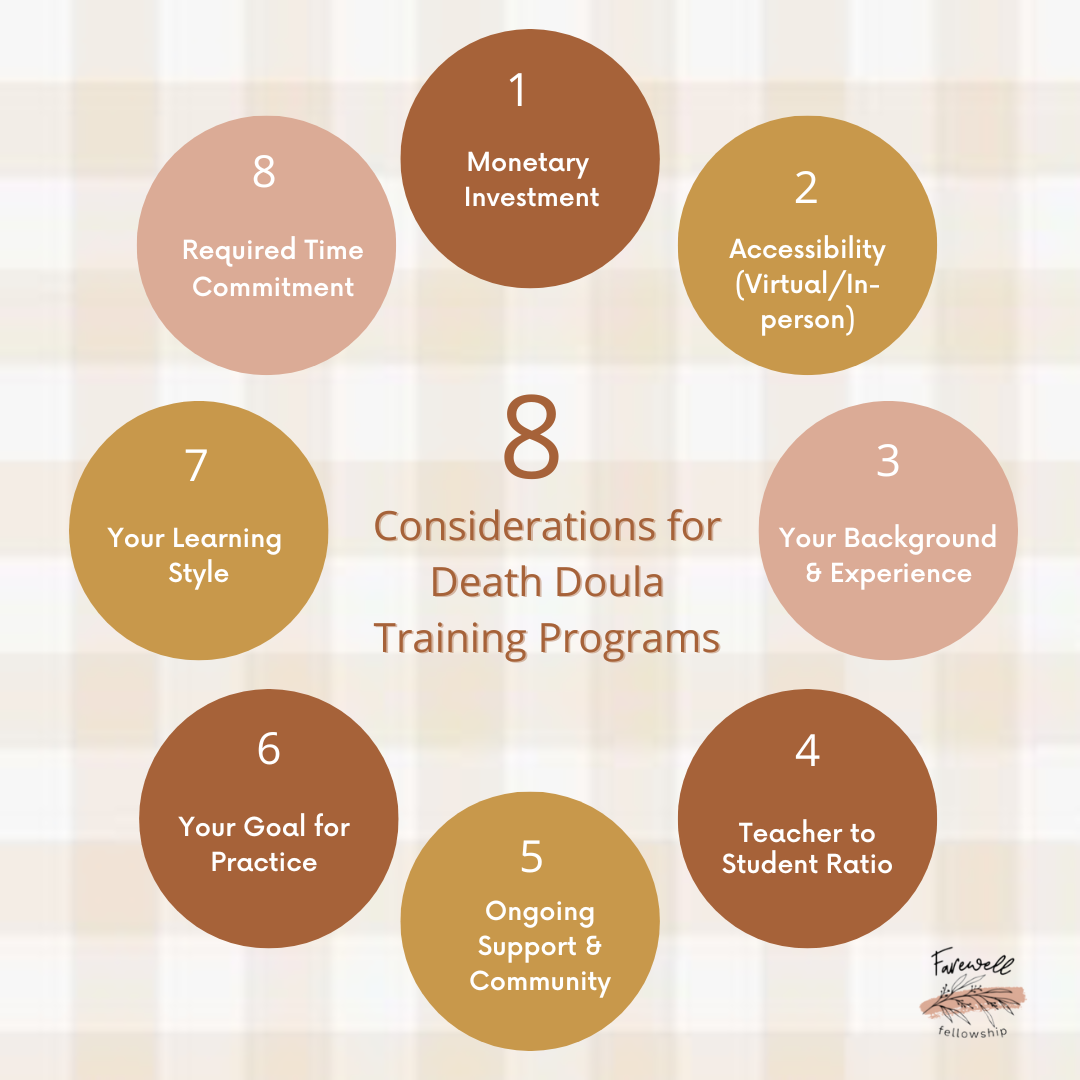8 Considerations for Choosing a Death Doula Training
My first death doula training was over a weekend with the International End of Life Doula Association (INELDA) in 2020. In May, I completed the nine-month intensive apprenticeship, the 9 Keys of Death Midwifery with Atlanta-based Death Midwife, N. Elizabeth Bazen. When asked about my experiences with both and my knowledge of other available trainings, I find that my experience was uniquely tailored to my personal journey into death work. While INELDA was an excellent primer for me, every single one of the 9 Keys was also wildly profound and incredibly helpful. Ultimately, choosing a death doula training can be daunting as there are dozens of options. Here are the top 8 things I suggest considering if you are seeking to compete your training as a death doula:
(1) Monetary Investment: Obviously this is one of the biggest considerations and the financial investment can range dramatically. For example, INELDA was $650 (plus travel costs because I attended in-person) and 9 Keys was $3k; Conscious Dying EOLD comes in around $2600 and Going With Grace ranges $1600-$1900. Don’t forget: this is the beginning of your death work education, not the extent of it. The time that your instructors will personally invest in your education is likely commensurate with the price that you will pay.
(2) Accessibility: It was super important to me that my initial training be in-person, which is one reason I chose INELDA. Post pandemic, it was super important that my training be online, which is now widely available. If you need to learn in-person, this will narrow your options significantly, to what is offered near you. Some programs may be local if you are in a big city (or just lucky!) while other programs do or have offered traveling options.
(3) Your Background & Experience: One thing I noticed about both of my trainings was the different perspectives between those already working/volunteering within the hospice system and those not. If you have tons of in-person experience with the dying, whether through family care, community work or profession, you may feel more intensive programs are a bit redundant. If you’re new to death work, the more information and guidance, the more comfortable you will be at the bedside. In my opinion, any training program will be greatly emphasized if you already have some bedside experience in visiting dying people who are not your family. If you hope to make a professional offering out of your death doula skills, I strongly suggest getting some hands on experience before the training. In particular, I remember a half-hour of my INELDA training being questions from the other students on how to introduce yourself to the dying person and their family, basic protocol for being at the bedside in a care capacity, etiquette in dealing with the family. This is easy experience to garner and you can save your time with the teachers for the things that you won’t figure out quickly and easy when you start this work.
(4) Teacher to Student Ratio: My INELDA training was 2 teachers : 60 students, my 9 Keys was 1 teacher : 4 students. Honestly, having a mentor to hold my hand and guide me to the places within my death work that needed to grow, was why I did the 9 Keys. There are other ways to hire a #deathdoulamentor but I really enjoyed the small group setup and the monthly 1:1 phone calls 9 Keys offered.
Additionally, is your teacher doing the work that you wish to do? This is a key for me. After finishing INELDA, my chief complaint was that I felt like I had been trained to be a hospice volunteer death doula. The training was perfect, as long as I was tucked into the wing of my hospice. But when I was ready to branch out into private practice, I had a ton of struggles. Which makes sense as Henry Fersko-Weiss and Janie Rakow (who led my training), predominately worked within the hospice system. One of biggest gifts of 9 Keys was being mentored by N. Elizabeth Bazen, a private practice death midwife, working one state over and doing very similar work to the work that I hoped to do. Her advice on running a small business (fee structures, contracts, marketing, community offerings) was priceless, because she is doing it too and in culturally similar communities. Also, it feels really, really good to have a mentor who understands your unique struggles and even still struggles occasionally with them too.
(5) Ongoing Support & Community: Deathwork can be lonely work, especially in your local community if you live in a conservative area. Having online support and community is so important to me, as is having a mentor I can call when I really need advice. INELDA offers a robust private Facebook group and their directory has been super useful to me in connecting with other local practitioners. 9 Keys offered community while going through the program, which I loved, but has less community options upon completion, though you do get a mentor to access when needed.
One other part of ongoing community and support is noting how active and involved the leaders of your death doula training are with the professional organizations that are currently organizing modern death workers. Does your training prepare you to pass the proficiency exams offered by the National End of Life Doula Alliance (NEDA) or the National Home Funeral Association (NHFA)? Does your trainer work actively with those and other organizations that guide death work? The more connected your trainer is, the more weight your training will hold. Though ideally this doesn’t matter, in today’s world, being part of a fledgling industry means those unfamiliar with death doula’s may want to research where you received your education and what exactly that entails.
(6) Your Goal for Practice: How much time, energy and money you’ll invest will likely be predicated on your goals for your death work practice. If you’re hoping to better support your loved ones, you may not need the higher investment options; whereas if you’re aiming to build a private practice, the more experience and wisdom, the better. Additionally, each program will have its strength and tuning into that niche will help inform your decision. For example, if you only intend to work within the hospice system, INELDA may be the perfect option. If you are looking for more spiritual connection within your death work and need assistance in tuning into the intuitive part of yourself, there is no better program than the 9 keys. Conscious Dying (as far as I can tell) has strengths in being very academic with a heavy dose of mindfulness and non-judgement. Going with Grace has a lot of strengths in being led by a former lawyer and is a pragmatic, organized approach with more than standard emphasis on end-of-life planning because of it’s creator’s background in law. Figure out the niche of the programs that you are considering and align your weak spots with the programs strengths.
(7) Your Learning Style: If you enjoy learning through listening, INELDA is a good fit for you. As an adult ADHD-er, it was super hard for me to sit in one room and look at a slide show for an entire weekend, even with the occasional break out groups. If you are a hands-on creative who learns best by engaging with the material, 9 Keys is perfect. In fact, I’m really proud of many of the things I created as part of my “homework”: collages, rituals, poems, essays, even videos and an errant recipe.
Some training programs are heavy on the reading, others focus on small group conversation, etc. Make sure the program you choose matches your inherent learning strength.
(8) Required Time Commitment: Last, how much time you desire investing in your preliminary training will play a big part in which program you choose. I had already volunteered for my local hospice for a year before I did INELDA and the 28-hour investment seemed like a good introduction into death doula work. And it served me well for a year. When I hit walls in my work and my practice, I turned to the 9 Keys and made a bigger investment in order to grow spiritually around the thing that had kept me blocked. How much time you have to invest is a big component to consider when choosing a death work training.
I get many emails each month asking for my advice on how to choose a death doula training. As you can see, there is no one size fits all answer. These are the 8 considerations I would touch on if I were giving advice to each individual. Ultimately, you can’t go wrong. All of the programs available offer beautiful tools to better serve the dying in our families and our communities.

